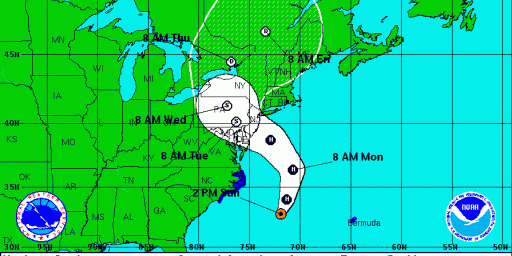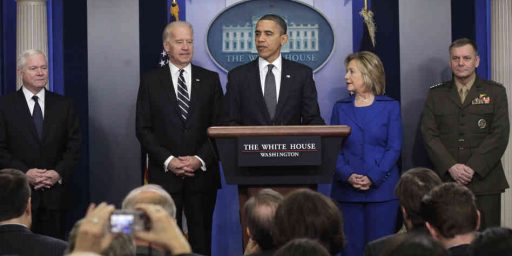Obama’s Surge Purge Emerges, Demonstrates Nerve, Verges on Scourge, Reactions Diverge
 Barack Obama has taken things off his campaign site that might be used by opponents to embarrass him, James Gordon Meek reports in the NY Daily News under the headline “Obama Purges Web Critique of Surge.” Why, it’s our Outrage of the Day!
Barack Obama has taken things off his campaign site that might be used by opponents to embarrass him, James Gordon Meek reports in the NY Daily News under the headline “Obama Purges Web Critique of Surge.” Why, it’s our Outrage of the Day!
Barack Obama’s campaign scrubbed his presidential Web site over the weekend to remove criticism of the U.S. troop “surge” in Iraq, the Daily News has learned.
The presumed Democratic nominee replaced his Iraq issue Web page, which had described the surge as a “problem” that had barely reduced violence. “The surge is not working,” Obama’s old plan stated, citing a lack of Iraqi political cooperation but crediting Sunni sheiks – not U.S. military muscle – for quelling violence in Anbar Province.
The News reported Sunday that insurgent attacks have fallen to the fewest since March 2004.
Obama’s campaign posted a new Iraq plan Sunday night, which cites an “improved security situation” paid for with the blood of U.S. troops since the surge began in February 2007. It praises G.I.s’ “hard work, improved counterinsurgency tactics and enormous sacrifice.”
Campaign aide Wendy Morigi said Obama is “not softening his criticism of the surge. We regularly update the Web site to reflect changes in current events.”
I question the timing. It’s awfully convenient that the Daily News published something on Sunday and the Obama campaign just happened to take that into account in a speech he gave on Monday, let alone that he just so happened to put that speech up on his Iraq page over the weekend!
Jim Hoft has screen caps proving the perfidy. He also gets in a perfectly clever CHANGE you can believe in… quip.
Ed Morrissey believes that “the Obama campaign has yet to acknowledge that the changes came from a strategy he opposed and that he predicted would fail. “ Obama‘s Monday NYT op-ed, “My Plan for Iraq,” does that, though:
In the 18 months since President Bush announced the surge, our troops have performed heroically in bringing down the level of violence. New tactics have protected the Iraqi population, and the Sunni tribes have rejected Al Qaeda — greatly weakening its effectiveness.
But the same factors that led me to oppose the surge still hold true.
One can reasonably disagree with his plan; indeed, I do. But he acknowledges the successes of the Surge while still arguing that it’s time to start drawing down our forces.
Scott Johnson says it’s 1984 and this is Obama’s version of the Ministry of Truth. Matt Lewis thinks it’s “sinister” and “secretive.” But campaign websites are marketing vehicles, not permanent document repositories. Nor do they operate on the ethical premises of the blogosphere, where purging old posts is considered unsporting.
Pamela Geller thinks that, “when he denies with a straight face that he’s changing anything, Obama gives new meaning to chutzpah.” But he’s not changing anything! He still supports withdrawal 16 months after he takes office, albeit with some caveats that he didn’t emphasize during the primaries. And he says right there in the NYT op-ed — published yesterday — that he opposed the Surge. If he’s trying to hide that fact, he’s going to need to be a mite more clever about it.
Dan Riehl gets to a much more productive debating point: “Obama claims to have judgment you can trust. I have to assume he’s talking to our enemies in the Middle-East given the judgment he displayed on the surge.”
More reactions at memeorandum: American Power, Blue Girl, Red State, www.redstate.com, American Spectator, JustOneMinute, Media Blog, The New Republic, TalkLeft, Marc Ambinder, Think Progress, The Swamp, Matthew Yglesias, The Strata-Sphere, democracyarsenal.org, Lawyers, Guns and Money, TPM Election Central, Behind the Numbers, Buck Naked Politics, Political Machine, Raw Story, On Deadline, American Power, Booman Tribune and The Fix





You got Mohammed Ali as a headline writer now, James?
I agree with Dan Riehl, this puts a chink in his judgment armor, especially on the Iraq war. He was right that getting in was a mistake, but that was pretty easy to get right (even if so many got it wrong). But the surge, that he (and I) got wrong, it was a tactical success far beyond what I believed was possible at the time. Unfortunately the strategic goals of the surge have not materialized.
Is everyone here entirely convinced that the uptick in US forces caused the decreased levels of violence? Correlation does not imply causation, especially when other factors (i.e. Sadr’s dictates, Sunni tribal recruitment, et al) are present.
I concede that having more boots on the ground probably didn’t hurt, but this meme that the “Surge fixed everything” feels too much like hand-waiving to me.
Anyone care to elaborate on how the additional forces directly contributed to lowering the casuality rates to 2005 levels?
There’s a good case to be made that Obama’s plan is a good idea precisely because of the major reasons for the decrease in violence, e.g., the Awakening, the Sadr truce, and so forth. His plan calls for phased reductions in troop levels–but with a major residual presence–but rewards the government for political progress. What we have now creates a major moral hazard, which is already producing serious problems.
Finally, all of this genuflecting needs to be updated, methinks, in light of the collapse of the SOFA talks.
This is a direct question for Michael. You think the Iraq war was a mistake I take it. What was it about Saddam you and B Hussein Obama like so much? Your former hero, William Jefferson Clinton signed a bill that called for the removal of Saddam from office in 1998. What had Saddam done between 1998 and 2003 that endeared him to you?
“Anyone care to elaborate on how the additional forces directly contributed to lowering the casuality rates to 2005 levels?â€
It wasn’t just an issue with the numbers but of policies. We were allowing arm militia to control areas within Iraq. Mostly out of the philosophy of not offending people or fear that areas would go up like a powder keg. The best way to keep the enemy from killing you is to kill them first. The additional forces gave the commanders more flexibility to go into these contested areas. It also gave them an ability to maintain a local presence instead of going through an area then leaving. Once the areas have been cleared and stabilize then the U.S. could reduce the combat forces and turn areas over to the Iraqi authorities. Could it have been done with less of a surge? Probably, but there would have been a much greater risk of the situation getting out of hand if things went sour. Also it is usually wise to hit the enemy on multiple fronts so they can’t move their assets around to counter your efforts.
Headline Score: 8.4
That wasn’t so much a question as it was an insinuation followed by a question mark.
No, the best way to keep the enemy from killing you is to make them want to kill somebody else more.
And we still do. Now we just pay them not to attack us.
Yes, because not thinking it wise to commit 130,000+ troops, spending trillions for a 6 year+ war demonstrates how much we liberals absolutely loved Saddam. For know on, I think that we should make it a permanent policy that our only way to demonstrate our dislike for a foreign leader is to go to war with them. Otherwise we’re just babying them. I’m hoping that you’ll join me in advocating for war with Mugabe, Jung Ill, Al-Assad, Ahmadinejad, Chavez, Castro, Gaddafi, Putin and his successor, and the litany of other leaders that I believe that we both dislike. I’m sure that our grandchildren can have this mission completed by 2080
“No, the best way to keep the enemy from killing you is to make them want to kill somebody else more.â€
You’re kidding right?
No, why, should I be?
Getting someone to want to kill someone else more than wanting to kill you does not prevent them from wanting and killing you. It may or may not distract them but that is about it. Besides whom should we get them to want to kill more? On top of that it is a very difficult and dangerous to try to manipulate something like that. It has a better chance of backfiring than succeeding not to mention the moral implications in trying to do so. Even if successful, there is nothing to keep them from changing their minds down the road and turning on you once again.
Another option which is not as simple and is generally not as effective is to get them from not wanting to kill you at all. Once war is engage the way to do this is to kill and harm them enough for them to give up. Being dead is the ultimate give-up. History has shown one sided appeasement during war is very ineffective.
Now all that talk was in a strategic sense. Tactically if you have an enemy that is killing you especially with ambushes, you attack their bases of operation and kill them. You don’t tell them the British are just over the hill and they have better food.
Yes there are political sensitive touchy touchy policies still in place. They hamper progress. War is meant to be awful, bloody and mean spirited. Otherwise there is not much of a reason not to conduct them. The problem is we try to fight wars through the MSM eyes and politicians. Now there is a time to transcend into a violence control force then rebuilding force. In the end there is a combination of them all. Our problem has been trying to put the wrong pig in the wrong hole. Of course it is much easier said than done.
Meanwhile, back in reality, the new Obama website is still critical of the surge, making it hard to argue that Obama has purged his website of material critical of the surge:
This is why the abovementioned rightwing blowhards are not arguing the point, they’re simply repeating it over and over to create a false conventional wisdom.
A side-by-side comparison can be found here. There is no major change in position, let along a “purge.”